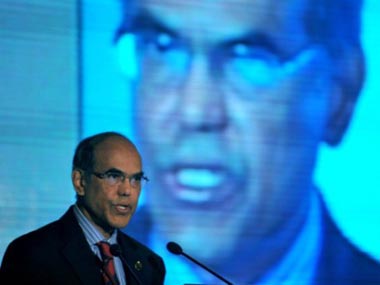Can central bankers play god to the markets? India’s central bank chief Duvvuri Subbarao does not believe so. In doing so, the Reserve Bank of India governor, a physics student, has taken refuge in quantum mechanics.
Subbarao takes the example of Einstein, who could not reconcile to the probabilistic nature of quantum mechanics all through his life.
Einstein famously said - “God does not play dice”. Less known perhaps is the retort of his friend and mentor Niels Bohr who said - “Albert, stop telling God what he can or cannot do”.
[caption id=“attachment_99358” align=“alignleft” width=“380” caption=“Central bankers have always enjoyed an elevated status in the financial world, possibly because of the wide-ranging powers they have enjoyed. Reuters”]  [/caption]
Subbarao draws this parallel in arguing that a central bank cannot tell markets what to do. “We have to take market signals as given,” Subbarao said in New York at a recent IMF meeting.
In fact, he went on to say that central bank decisions get more validity if the market endorses them.
Central bankers have always enjoyed an elevated status in the financial world, possibly because of the wide-ranging powers they have enjoyed. True, the sheen has come off at times.
Liaquat Ahamed referred to this in Lords of Finance when he wrote about central bankers ruling the financial world in the late 1920s - Benjamin Strong Jr of the New York Federal Reserve, Montagu Norman of the Bank of England, mile Moreau of the Banque de France, and Hjalmar Schacht of the Reichsbank. The Wall Street crash of 1929 and the depression that ensued crippled an entire generation and set the stage for the second World War. The orthodoxy of the central bankers of the day in trying to adhere to the gold standard was a prime cause.
The media, of course, has played a big role in creating this mythical creature called the central banker. In 1999, Time magazine ran a cover story titled ‘The Committee To Save The World’ featuring then Federal Reserve Chairman Alan Greenspan along with Robert Rubin and Larry Summers (then secretary and deputy secretary of Treasury) for their role in averting a global meltdown after Asia’s tiger economies faced a debt repayment crisis.
This stereotype was particularly so of Alan Greenspan, under whom interest rates were ultra low and the market was flooded with dollars. To many, Greenspan, whose career at the Federal Reserve spanned nearly two decades, was god. All that came crashing down when the financial crisis broke in 2008 and the very same low interest rates were blamed for the subprime mess and housing bubble in the United States.
Subsequently, it’s been mostly downhill for central bankers. The Economist, in a piece in Oct 2010, accused Bank of England Governor Mervyn King of playing god when in a speech he savaged the performance of Britain’s banks before the crisis and criticised the new Basel 3 proposals as too soft. Tongue in cheek, the Economist said trying to reinvent finance was a lot more fun than shifting interest rates by 25 basis points once in a while.
But to be fair, most central bankers haven’t claimed a god status. It was something that was mostly thrust on them. But the one who takes the cake is Goldman Sachs boss Lloyd Blankfein who famously said that banks serve a social purpose and are doing “god’s work”. This was after reckless investment banks, in search of supernormal profits, plunged the advanced economies into recession. It was the central bankers who had to rush in with trillions of dollars to ward off armageddon.
Reuters


)
)
)
)
)
)
)
)
)



